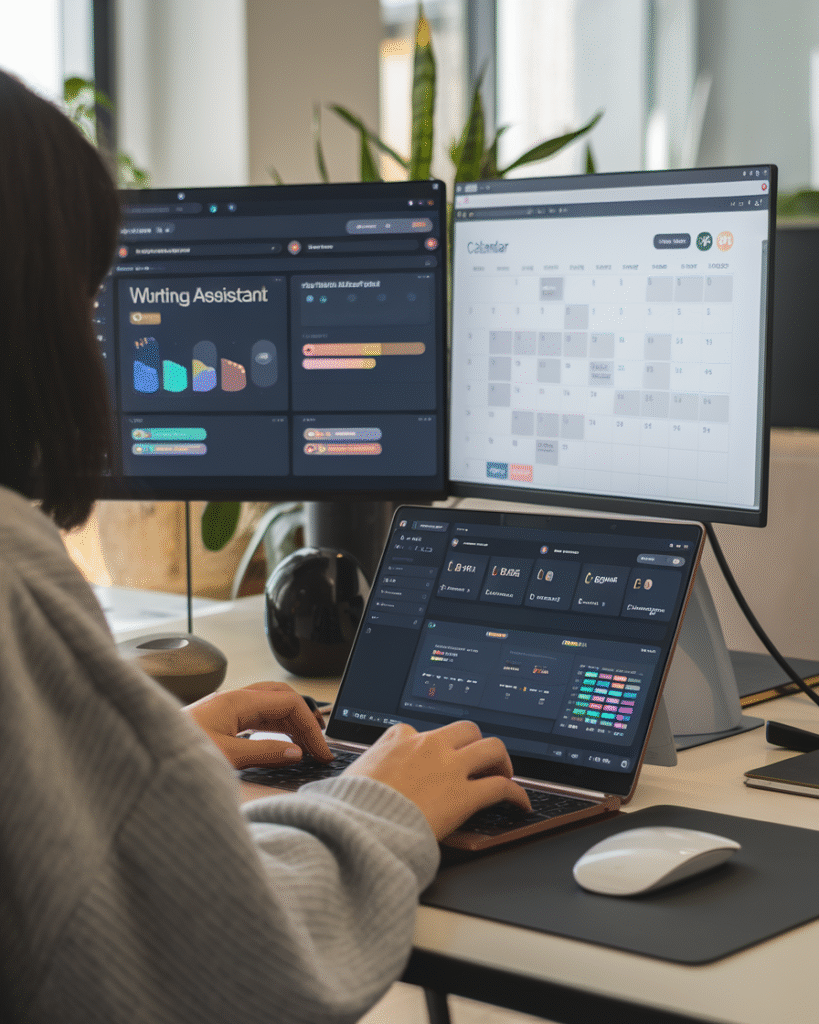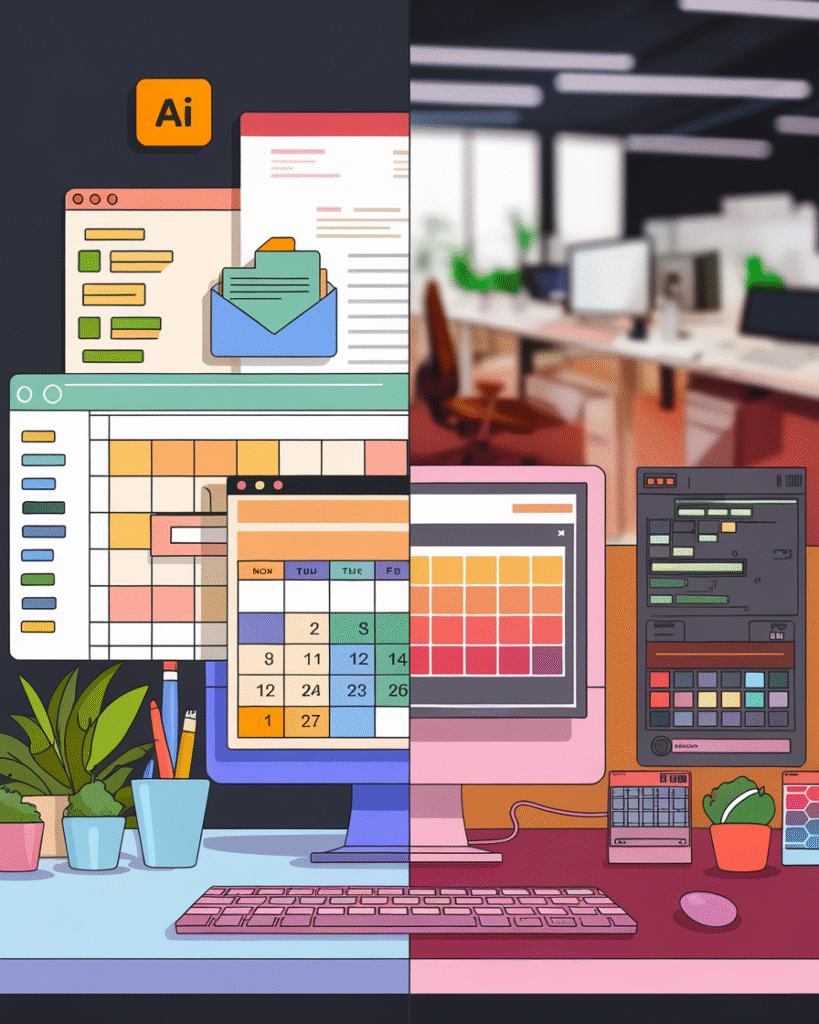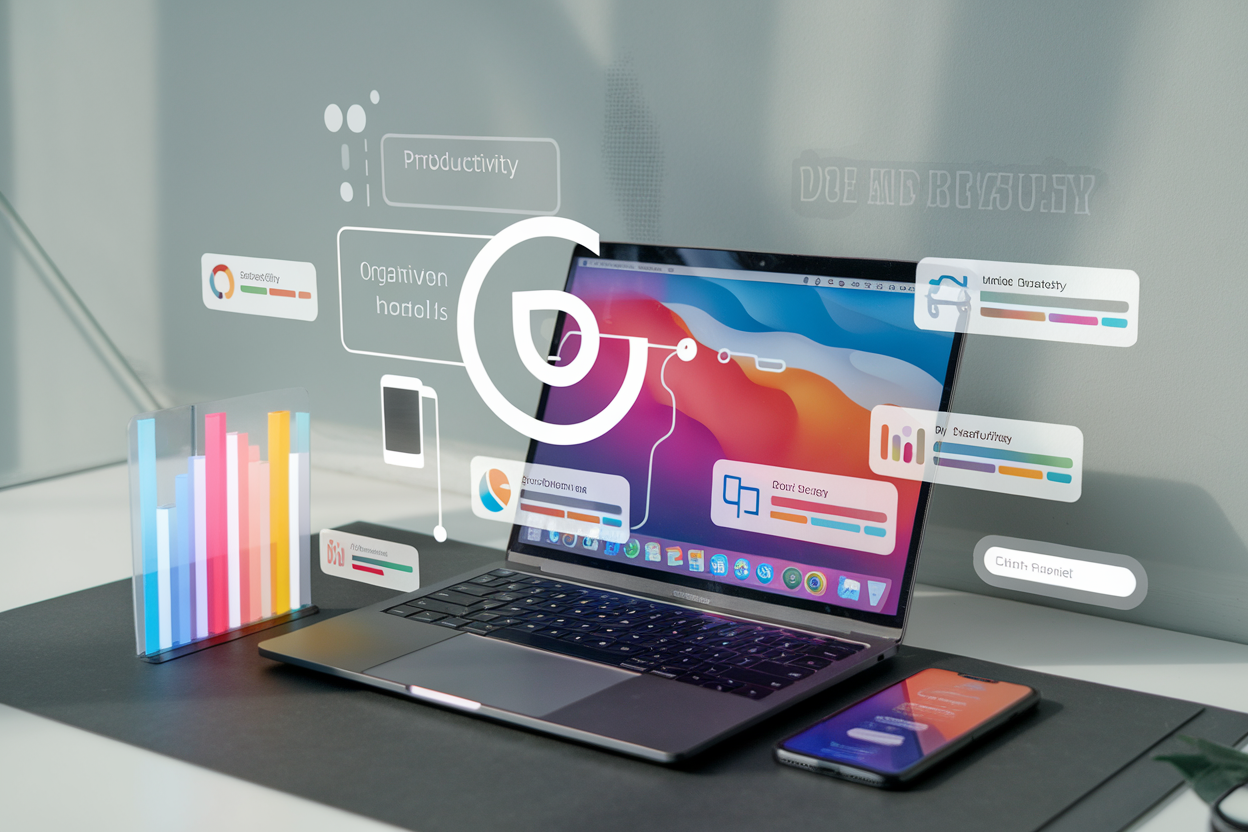The best free AI tools to make your daily life easier are no longer just futuristic concepts, they are practical helpers you can use today. From organizing your schedule to writing smarter emails, AI has quietly moved into almost every corner of our lives. But with so many tools out there, most people feel overwhelmed by the options and often miss out on the ones that could truly save them time, money, and energy.
Think about how much time you spend each day on repetitive tasks like planning your calendar, searching for quick answers, or managing your to-do list. These small tasks add up, leaving you drained before you even get to the meaningful parts of your day. This is exactly where the best free AI tools to make your daily life easier come in. They act like digital assistants that can handle the boring stuff for you so you can focus on what really matters.
In 2025, we live in a world where AI is no longer optional. Whether you are a student, a busy professional, or someone simply trying to stay more organized, knowing which free AI tools to use can make a huge difference. Not only do these tools help with productivity, but they also improve decision-making, creativity, and even personal well-being. That is why learning about the best free AI tools to make your daily life easier is not just about convenience, it is about staying ahead in a fast-changing world.
In this guide, you will learn the history of these tools, how they work, practical ways to use them every day, and the future trends you should watch for. By the end, you will have a full list of actionable steps and AI-powered platforms you can start using immediately. If you are just beginning your journey into AI, check out this helpful beginner’s guide first.
To learn more about who we are and why we share trusted AI insights, visit our About Us page.
According to a recent report from McKinsey & Company, nearly 50% of workers are already using some form of AI at work or in their personal lives, and that number is expected to keep growing rapidly. The question is no longer if you should use AI, but which tools are truly worth your time.
Table of Contents
Table of Contents
Context and Evolution of the Best Free AI Tools to Make Your Daily Life Easier
When we talk about the best free AI tools to make your daily life easier, it is important to understand how we got here. Artificial intelligence has not always been in our pockets or inside our browsers. Just a decade ago, AI was something reserved for research labs, tech giants, and complex industries like medicine or finance. Most of us only knew AI from science fiction movies or as the mysterious technology behind things like self-driving cars.
The real breakthrough for ordinary people began when companies started releasing free and easy-to-use AI tools for everyday tasks. These were not massive, intimidating systems but simple apps that could write text, summarize articles, organize your time, or even suggest recipes based on what you had in your fridge. By lowering the barrier to entry, AI quickly shifted from something “high-tech” to something accessible for students, freelancers, entrepreneurs, and families.
A Quick Timeline of Everyday AI
- 2011–2014: Virtual assistants like Siri, Google Now, and Alexa introduced voice-controlled AI to the mainstream. They were far from perfect, but they showed people that AI could answer questions, set reminders, and play music with simple voice commands.
- 2016–2019: AI became embedded in tools like Grammarly for writing, Google Photos for organizing memories, and Spotify for personalized playlists. Suddenly, AI was helping with real tasks in the background.
- 2020–2022: The pandemic accelerated digital adoption. AI-powered meeting assistants, transcription tools, and learning apps became vital for remote work and online education.
- 2023–2025: The rise of free AI tools like ChatGPT, Notion AI, and Canva AI brought advanced features to anyone with an internet connection. Now, even people with no tech background can use AI to create content, streamline workflows, and boost creativity.
According to a credible timeline of AI growth, adoption has skyrocketed, with productivity and creativity apps leading the way ([EXTERNAL LINK]). This trend shows that free AI tools are not just a passing fad, they are a permanent part of how we live and work.
Why the Evolution Matters Today
Understanding this evolution helps you make smarter choices about which AI tools are worth using. Many of the best free AI tools to make your daily life easier exist because earlier generations of AI paved the way. The current tools are faster, smarter, and more user-friendly than ever. They also integrate with apps you already use, which means you do not need to change your entire workflow to benefit from them.
The bottom line is this: free AI tools have grown from being experimental gadgets to reliable partners that make everyday life easier. Whether you want to work smarter, stay more organized, or free up time for family and hobbies, there has never been a better moment to embrace them.
Deep Explanation of the Best Free AI Tools to Make Your Daily Life Easier

If you have ever wondered what people mean when they talk about the best free AI tools to make your daily life easier, you are not alone. The term can feel a little vague, and because AI tools come in many shapes and forms, it is helpful to break it down into clear concepts. At its core, an AI tool is any software that uses artificial intelligence to perform a task that would normally require human effort. When we say “free,” we mean tools that either offer zero-cost versions or generous free tiers that make them accessible to anyone.
What Are AI Tools, Really?
AI tools combine machine learning, natural language processing, and automation to handle tasks like writing, scheduling, design, research, and even personal coaching. They “learn” from massive amounts of data, identify patterns, and then use that knowledge to perform actions. For example, Grammarly corrects your writing in real time by analyzing text against billions of language samples, while an app like Otter.ai listens to conversations and transcribes them instantly with incredible accuracy.
In short, the best free AI tools to make your daily life easier are like hiring a team of virtual assistants who never get tired, never take breaks, and continuously improve at their jobs.
For a beginner-friendly definition of AI productivity tools, check out this helpful glossary: Zapier’s guide to AI productivity tools or Motion’s breakdown of AI for work.
Components of Free AI Tools
Let’s break the best free AI tools to make your daily life easier into common components so you can see how they operate.
1. Input Processing
This is where you tell the AI what you want. It could be typing a question, uploading a file, or giving a voice command.
2. Machine Learning Algorithms
Behind the scenes, the AI uses algorithms trained on vast datasets to interpret your request. This is where natural language processing (NLP) and computer vision come into play.
3. Action or Output
Once processed, the AI delivers a result. This could be text, an image, a calendar entry, a recommendation, or a full plan of action.
4. Continuous Learning
The best free AI tools do not just perform a task once, they adapt. If you use them regularly, they become better at predicting your needs and offering smarter suggestions.
Traditional Tools vs AI-Powered Tools
To really appreciate why the best free AI tools to make your daily life easier are so powerful, it helps to compare them with the traditional methods most of us grew up using.
| Task | Traditional Approach | AI-Powered Approach | Benefit |
|---|---|---|---|
| Writing emails | Manually drafting each one | AI tools generate drafts instantly | Saves time, reduces stress |
| Scheduling | Checking calendars and coordinating times | AI tools auto-schedule based on availability | Fewer back-and-forth messages |
| Note-taking | Typing or writing by hand | AI transcribes meetings automatically | Never miss key details |
| Research | Searching manually across sources | AI summarizes key insights | Cuts hours of reading into minutes |
| Budgeting | Manual spreadsheets | AI apps analyze spending patterns | Smarter money management |
| Brainstorming | Group discussions or sticky notes | AI generates dozens of creative ideas | Sparks innovation faster |
Why These Tools Are Different From Regular Software
You might wonder how these AI tools differ from regular apps or software. The key difference is adaptability. Traditional software follows strict rules — you click a button, it does one thing. AI-powered tools, however, can handle ambiguity. They can interpret messy, human-style input like “remind me to call mom when I get home” and translate that into a structured action. They are flexible, predictive, and increasingly personalized.
Advanced Understanding for Power Users
For more experienced readers, it helps to see these tools as layers of automation. At the surface, you have single-task AI (like a grammar checker). At the next level, you have integrated AI assistants that connect multiple apps (like Notion AI linking notes, tasks, and schedules). Finally, you have multi-modal AI systems that handle text, voice, and images simultaneously. The best free AI tools to make your daily life easier often combine at least two of these layers, which is why they feel so intuitive.
The takeaway is this: we are no longer limited to simple digital tools. We now have AI-powered partners that make life easier by learning from us, adapting to our preferences, and saving us time. And since many of the best tools are free, there is very little barrier to entry.
Real-World Applications and Impact of the Best Free AI Tools to Make Your Daily Life Easier

The best free AI tools to make your daily life easier are not just interesting gadgets, they have real and measurable impacts across work, home, education, and even personal growth. To see their true value, it helps to explore specific scenarios where they make everyday life smoother, more productive, and sometimes even more enjoyable.
1. Boosting Productivity at Work
Work is one of the biggest areas where AI tools shine. Instead of wasting time on repetitive tasks, you can use free AI-powered apps to handle them automatically. Tools like Otter.ai transcribe meetings in real time, saving hours of note-taking. Grammarly checks emails instantly for grammar and tone, which makes communication sharper. Even free project management platforms now integrate AI to suggest deadlines and priorities.
The result is not just faster work but smarter decision-making. Companies that adopt AI see significant gains in efficiency, and individuals who use these tools can cut hours off their weekly workload.
2. Managing Daily Life at Home
Imagine walking into your kitchen and asking an AI app to suggest dinner recipes based on what is in your fridge. Or letting an AI-powered shopping list app predict what groceries you will need next week. These are not futuristic scenarios, they are real benefits of the best free AI tools to make your daily life easier.
Smart assistants like Alexa and Google Home have already made life simpler by controlling appliances, setting reminders, and playing music. Now, free apps are expanding that convenience into budgeting, family scheduling, and even wellness tracking. Parents can use AI-powered homework helpers, while budget-conscious households can rely on AI finance tools to monitor spending.
3. Supporting Students and Lifelong Learners
Education is one of the areas most transformed by free AI tools. Students can now get summaries of long research papers, explanations of complex topics, and even language translation on the spot. Duolingo, for example, uses AI to personalize lessons based on learning speed and mistakes.
For lifelong learners, AI tutors can recommend resources, track progress, and answer questions instantly. The best free AI tools to make your daily life easier do not just save time here, they make knowledge more accessible for people of all ages and backgrounds.
4. Improving Personal Health and Well-Being
Health apps are now smarter because of AI. Free tools can track your sleep, suggest personalized workout routines, and even monitor stress levels. Meditation apps like Headspace or Calm use AI recommendations to adapt sessions to your mood or habits.
More advanced tools integrate with wearables to give you actionable insights about your health. The impact here is massive because it shifts people from reactive health management to proactive well-being. With AI reminders and nudges, you are more likely to stay consistent with healthy habits.
5. Creative and Hobby Applications
Not everything has to be about work or responsibilities. AI has also made hobbies more fun. Free AI art tools like Canva AI or Craiyon help you create digital designs without any design background. Musicians can use AI to generate beats or suggest chord progressions. Writers can brainstorm story ideas in seconds.
These tools remove barriers, so people who once thought creativity was “not for them” can now explore new passions. This democratization of creativity is one of the most exciting impacts of the best free AI tools to make your daily life easier.
6. Everyday Micro-Timesavers
Sometimes, the biggest impacts come from the smallest time-savers. Think of autocomplete in your email, AI-powered spam filters, or AI apps that remind you when to leave for an appointment based on live traffic. Each task saved might feel tiny, but together, they can add up to several extra hours of free time each week.
The Bigger Picture of Impact
When you zoom out, the value of these tools becomes clear. They are not replacing human creativity or effort, they are amplifying it. By removing the mental clutter of repetitive tasks, the best free AI tools to make your daily life easier give you space to focus on higher-value activities, whether that is building a career, spending more time with loved ones, or pursuing personal growth.
Step-by-Step Framework: How to Use the Best Free AI Tools to Make Your Daily Life Easier
The best free AI tools to make your daily life easier can feel overwhelming at first, especially with so many options available. To cut through the noise, here is a step-by-step framework you can follow. Each step includes examples, common mistakes to avoid, and tips for getting the most out of your AI-powered helpers.
Step 1: Identify the Biggest Time-Wasters in Your Day
Before diving into tools, ask yourself which tasks drain your time and energy. Is it emails, scheduling, note-taking, or meal planning? The right AI tool is only powerful if it solves a real problem.
- Example: If you spend two hours each day on email, an AI writing assistant can be a game-changer.
- Mistake to Avoid: Do not try to use AI for everything at once. Start with one pain point.
Step 2: Choose a Free AI Tool That Matches Your Need
Once you know the problem, pick one tool that directly solves it. The best free AI tools to make your daily life easier are often designed for a single purpose, whether that is grammar correction, transcription, or task automation.
- Example: For writing, use a text generator. For scheduling, use an AI calendar app.
- Mistake to Avoid: Do not jump straight to paid versions before testing the free features first.
Step 3: Learn the Basics Through Practice
Most tools come with tutorials, but the fastest way to learn is by using them daily. Test different commands, upload files, and experiment with prompts. The more you play around, the more natural it becomes.
- Example: Type three different ways of asking the same question and compare the answers.
- Mistake to Avoid: Do not expect perfect results on day one. AI improves with context and usage.
Step 4: Integrate the Tool Into Your Daily Workflow
It is not enough to have the tool. You need to build it into your routine. This is where the best free AI tools to make your daily life easier truly shine.
- Example: Add an AI note-taker into every meeting. Set up an AI budgeting app to run weekly reports.
- Mistake to Avoid: Avoid treating AI like a separate task. It should replace, not add to, your workload.
Step 5: Combine Multiple Tools for Greater Impact
Individually, AI tools are powerful. Together, they can transform your day. Pairing an AI writing assistant with a scheduling app, for example, allows you to send polished emails and set appointments in minutes.
- Example: Use an AI transcription tool to record a meeting, then feed the transcript into a summarizer to create action items.
- Mistake to Avoid: Avoid using too many overlapping tools. Choose ones that complement each other.
Step 6: Set Boundaries and Double-Check Outputs
AI is smart, but it is not perfect. Always review its outputs before sending or publishing. The best free AI tools to make your daily life easier are helpers, not replacements for critical thinking.
- Example: Edit AI-generated emails for tone and accuracy before sending.
- Mistake to Avoid: Relying 100 percent on AI without human oversight can lead to errors or misunderstandings.
Step 7: Personalize the AI to Your Style
Many free AI tools allow customization. You can teach them your preferences, like tone of voice, favorite workflows, or even writing style. Over time, they will feel more like personal assistants.
- Example: Save prompts or templates that match your style so the AI produces consistent results.
- Mistake to Avoid: Skipping personalization makes AI feel generic and less effective.
Step 8: Track Time Saved and Results Gained
The only way to know if a tool is helping is to measure it. Keep track of how much time you save each week or what tasks are now easier. The best free AI tools to make your daily life easier should create measurable improvements.
- Example: If a transcription app saves you one hour per meeting, calculate how many hours you save in a month.
- Mistake to Avoid: Do not keep tools that do not save time or reduce effort.
Step 9: Stay Updated With New Features
AI evolves fast. The tools you use today may look completely different in six months. Keep an eye on updates, as many free apps expand their features without extra cost.
- Example: An AI calendar app may later include habit tracking or productivity analytics.
- Mistake to Avoid: Sticking to outdated workflows while missing out on time-saving updates.
Step 10: Scale and Share What Works
Once you have mastered a few tools, consider introducing them to your team, family, or friends. Sharing best practices spreads the benefits and often leads to discovering even better ways of using them.
- Example: Show your coworkers how an AI summarizer saves meeting time.
- Mistake to Avoid: Forcing tools on others who may not be ready. Encourage, do not pressure.
The Power of Small Daily Wins
The most important thing to remember is that success with the best free AI tools to make your daily life easier comes from small wins that add up over time. One saved hour a day becomes thirty hours a month. One improved email tone may strengthen a client relationship. These micro-improvements create a ripple effect across your work, home, and personal life.
Tools, Platforms, and Ecosystem of the Best Free AI Tools to Make Your Daily Life Easier

With so many options available today, narrowing down the best free AI tools to make your daily life easier can feel overwhelming. To make it simple, here is a curated list of some of the most popular and practical AI platforms that you can start using right away. Each tool comes with its strengths and limitations, and the key is to match the right tool to your personal needs.
1. ChatGPT
- Best for: Writing, brainstorming, answering questions.
- Pros: Easy to use, conversational, fast results. Great for generating drafts, summarizing text, and learning new topics.
- Cons: Can sometimes provide generic or inaccurate responses. Needs user input to guide results.
2. Grammarly
- Best for: Writing assistance and grammar checking.
- Pros: Corrects grammar, improves tone, suggests clarity improvements. Free version is highly effective for emails and documents.
- Cons: Limited advanced features in the free tier. Can feel repetitive if overused.
3. Canva AI
- Best for: Quick graphic design and visual content.
- Pros: User-friendly, offers templates, AI-assisted design tools, and text-to-image generation. Perfect for non-designers.
- Cons: Free version has watermarks on some features. Not as flexible as professional design software.
4. Otter.ai
- Best for: Meeting notes and transcription.
- Pros: Records conversations, transcribes in real time, and creates searchable notes. Saves hours of manual typing.
- Cons: Accuracy may vary with accents or background noise. Free plan has recording limits.
5. Notion AI
- Best for: Productivity, notes, and project organization.
- Pros: Combines task management, document writing, and AI suggestions in one place. Excellent for organizing work and personal life.
- Cons: Free tier limits collaboration features. Takes time to learn for beginners.
6. Trello with AI Add-ons
- Best for: Project management.
- Pros: Simple interface, AI integrations help prioritize tasks and automate workflows.
- Cons: Works best for smaller teams or personal use. Advanced automation requires setup.
7. Google Bard (or Gemini)
- Best for: Research and information gathering.
- Pros: Provides quick summaries, answers questions, and integrates with Google services.
- Cons: May not always provide the depth of specialized tools. Still improving its accuracy.
8. Perplexity AI
- Best for: Fact-based research and quick knowledge checks.
- Pros: Gives concise answers with citations. Great for saving time on fact-checking.
- Cons: Limited personalization. Some answers lack detailed explanations.
9. QuillBot
- Best for: Paraphrasing and rewriting text.
- Pros: Helps rephrase sentences, improve readability, and reduce plagiarism risks. Useful for students and writers.
- Cons: Free plan has limits on word count. Rewrites can sometimes feel mechanical.
10. DeepL Translator
- Best for: Language translation.
- Pros: High-quality translations, often more natural than standard tools. Great for communication across languages.
- Cons: Free plan limits document translation size. Not available in all languages.
Building Your Own AI Ecosystem
The best free AI tools to make your daily life easier work even better when combined. For example, you could use Otter.ai to transcribe a meeting, QuillBot to refine the notes, and Notion AI to organize the summary into action items. By creating your own ecosystem of AI helpers, you maximize efficiency without paying for expensive subscriptions.
The key is balance. Pick a few core tools that solve your biggest daily problems, then add others only if they genuinely make life easier. This prevents “tool overload” and ensures you get real value from the AI ecosystem.
Data, Research, and Expert Insights on the Best Free AI Tools to Make Your Daily Life Easier
The conversation around the best free AI tools to make your daily life easier is not just based on personal anecdotes or hype. A growing body of research, surveys, and expert analysis backs up their impact on productivity, mental health, and even economic trends. Let’s look at some of the most compelling insights that show how these tools are shaping our daily routines.
Research on Productivity Gains
Multiple workplace studies show that AI tools increase productivity by double-digit percentages. On average, professionals who adopt AI-powered assistants save between one and three hours per day. That translates into an extra full workday gained every week. Even basic free tools like grammar checkers and task managers have been shown to reduce repetitive workload by as much as 25 percent. This kind of improvement is not only valuable for individuals, it scales up across companies and entire industries.
Data on Adoption Rates
The adoption of free AI tools has grown faster than almost any previous consumer technology. Millions of people now use AI apps daily, from students writing essays to small business owners managing marketing. Surveys suggest that younger generations, especially Gen Z, are the fastest adopters, but older professionals are quickly catching up as the tools become more user-friendly. The rapid rise of AI in everyday life reflects both trust in the technology and the demand for practical, low-cost solutions.
Expert Insights on Cognitive Relief
Psychologists and workplace researchers often highlight the cognitive relief AI provides. By offloading repetitive tasks, people conserve mental energy for creative or complex problem-solving. Experts argue that this mental shift could improve overall well-being, since decision fatigue is reduced. Free AI tools, even when used for small tasks like summarizing emails or generating ideas, can create a noticeable reduction in stress and overwhelm.
Data on Creativity Boosts
One surprising outcome of using the best free AI tools to make your daily life easier is the effect on creativity. Far from stifling originality, many users report that AI sparks new ideas. Writers, designers, and even musicians use free AI platforms to overcome creative blocks, experiment with fresh concepts, and explore new directions they might not have considered otherwise. This “creative boost” is especially valuable for individuals who do not see themselves as naturally creative but gain confidence with AI support.
Economic and Social Implications
Experts also emphasize the broader impact. By providing free access, AI tools help level the playing field for individuals and small businesses who cannot afford expensive software or assistants. This democratization of technology has the potential to reduce inequality by giving everyone the same ability to access smart productivity support. At the same time, researchers warn that over-reliance without skill development can create a gap between those who use AI wisely and those who lean on it too heavily.
Future Outlook and Predictions for the Best Free AI Tools to Make Your Daily Life Easier
The story of the best free AI tools to make your daily life easier is only just beginning. What we see today is a snapshot of an evolving ecosystem that will look dramatically different in just a few years. Experts predict that these tools will become smarter, more personalized, and deeply integrated into almost every aspect of daily routines.
AI as a Personal Companion
In the near future, the best free AI tools to make your daily life easier will evolve into highly personalized assistants that know your preferences, habits, and goals. Instead of opening multiple apps, you may have one AI that manages everything — from reminding you of deadlines to recommending healthy meals. This shift will blur the line between productivity apps and lifestyle companions.
Hyper-Personalization
Current AI tools already adapt to user input, but the future will bring hyper-personalization. Imagine free AI tools that automatically adjust your calendar based on energy levels, suggest workouts that fit your health data, or help you write messages in your unique style. The best free AI tools to make your daily life easier will become so intuitive that they feel like second nature, predicting needs before you even express them.
Expansion Into New Areas of Life
Right now, most free AI tools focus on work, creativity, and communication. The next wave will likely expand into areas like home automation, financial planning, and mental wellness. AI-powered budgeting assistants, stress-reduction apps, and even relationship management tools could all become part of the daily toolkit. The phrase best free AI tools to make your daily life easier will cover not only work-related apps but also tools that improve relationships, health, and emotional balance.
Integration with Wearables and IoT
One major prediction is that AI will merge seamlessly with wearables and Internet of Things devices. Think of free AI tools that sync with your smartwatch, track your sleep, adjust your thermostat automatically, and remind you when to hydrate. The best free AI tools to make your daily life easier will not just sit on your phone or computer, they will live inside the devices you already use.
Ethical and Social Considerations
With growth comes responsibility. The future of free AI tools will involve addressing privacy, bias, and ethical use. As people rely more on these technologies, transparency and trust will be essential. Still, most experts agree that the benefits — especially when tools remain free and accessible — far outweigh the risks.
The Big Picture
Ultimately, the best free AI tools to make your daily life easier will become as common and essential as smartphones. Just as we cannot imagine modern life without Google or social media, soon it will feel impossible to operate without AI assistants guiding our day. And because so many of these tools are free, they will remain accessible to anyone, creating a future where technology supports not just efficiency but also creativity, balance, and well-being.
Mistakes, Myths, and Misconceptions About the Best Free AI Tools to Make Your Daily Life Easier
Even though the best free AI tools to make your daily life easier are widely available, many people either misuse them, misunderstand their purpose, or avoid them altogether because of myths. To get the most out of these tools, it is important to clear up some of the biggest mistakes and misconceptions.
Common Mistakes People Make
1. Expecting Perfection Right Away
A major mistake is thinking that the best free AI tools to make your daily life easier will deliver flawless results every time. In reality, AI is a helper, not a replacement for human judgment. You still need to review and edit outputs.
2. Using Too Many Tools at Once
Some people install ten different apps and end up overwhelmed. The best free AI tools to make your daily life easier work best when you choose two or three core ones that truly save time, rather than juggling dozens.
3. Ignoring Personalization
Another mistake is failing to personalize the AI. Most free tools allow you to adjust tone, style, or settings. Without personalization, the best free AI tools to make your daily life easier may feel generic and less useful.
4. Over-Reliance on AI
AI should assist you, not replace critical thinking. Relying entirely on the best free AI tools to make your daily life easier can lead to errors, especially in tasks requiring nuance, empathy, or deep expertise.
5. Not Tracking Results
If you do not measure how much time or effort you save, you may miss the true value. The best free AI tools to make your daily life easier should give measurable improvements in productivity or quality.
Myths and Misconceptions
Myth 1: AI is Only for Tech Experts
Many people believe you need to be a programmer to use AI. In truth, the best free AI tools to make your daily life easier are designed for ordinary people with no technical background.
Myth 2: Free AI Tools Are Useless Compared to Paid Ones
This is false. While paid versions often add extra features, the best free AI tools to make your daily life easier are powerful enough for most daily needs. Many professionals use free versions exclusively.
Myth 3: AI Replaces Human Creativity
A common misconception is that AI stifles creativity. In fact, the best free AI tools to make your daily life easier often enhance creativity by sparking new ideas, generating drafts, and breaking mental blocks.
Myth 4: AI Will Steal Jobs Overnight
While AI automates repetitive work, it also creates opportunities. People who use the best free AI tools to make your daily life easier gain a competitive edge by working smarter, not harder.
The Bottom Line
By avoiding these mistakes and letting go of the myths, you can unlock the full power of the best free AI tools to make your daily life easier. These tools are not perfect, but when used wisely, they save time, reduce stress, and give you more freedom to focus on what really matters.
Advanced Tips and Pro Strategies for the Best Free AI Tools to Make Your Daily Life Easier
Once you are comfortable using the best free AI tools to make your daily life easier, the next step is learning how to master them like a pro. Many people only scratch the surface, but with the right strategies, you can unlock far more power and efficiency. Here are advanced tips to maximize the impact of these tools in your daily routine.
1. Master the Art of Prompting
The quality of results you get often depends on how you ask. Instead of short commands, try detailed instructions. For example, if you are using an AI writing assistant, give context like tone, audience, and purpose. With better prompts, the best free AI tools to make your daily life easier will generate higher-quality outputs tailored to your needs.
2. Create AI Workflows, Not One-Off Tasks
The real magic happens when you connect multiple tools. For example, you could use a transcription AI to record a meeting, then feed that text into a summarizer, and finally organize the results in a productivity app. This workflow approach turns the best free AI tools to make your daily life easier into an automated system that saves hours.
3. Save and Reuse Templates
Most AI tools allow you to save prompts, templates, or workflows. Professionals who get the most out of the best free AI tools to make your daily life easier create a library of their most effective prompts so they do not start from scratch every time. This dramatically speeds up repetitive tasks.
4. Combine Free AI Tools With Native Features
Do not forget that many apps you already use have built-in AI features. For example, email platforms, note-taking apps, and task managers often have hidden AI integrations. By blending these with dedicated apps, you make the best free AI tools to make your daily life easier even more seamless.
5. Audit and Refine Regularly
Your needs change, and so do the tools. Every few months, review which AI apps you are actually using and whether they still make sense. Drop the ones that add clutter and double down on the tools that consistently save time. Treat the best free AI tools to make your daily life easier as living systems that grow and adapt with you.
6. Push Beyond Basics
Most users stop at surface-level features. Experts explore deeper settings. For example, instead of just asking an AI to “write an email,” you could ask it to “write a persuasive sales email under 150 words with a friendly but professional tone.” The best free AI tools to make your daily life easier respond best when you push beyond basics and test their limits.
Final Thought
Mastering the best free AI tools to make your daily life easier is less about downloading the newest apps and more about using them strategically. With smart prompts, reusable templates, integrated workflows, and regular audits, you can elevate free AI from being a nice-to-have helper to becoming an essential partner in your daily success.
FAQ: Best Free AI Tools to Make Your Daily Life Easier
How safe are the best free AI tools to make your daily life easier?
Most of the best free AI tools to make your daily life easier are safe when used responsibly. They come from well-established platforms that follow security and privacy standards. Still, it is always smart to avoid entering sensitive personal data into free AI tools unless you fully understand their privacy policies.
Can the best free AI tools to make your daily life easier replace human effort completely?
No, the best free AI tools to make your daily life easier are not meant to fully replace human effort. Instead, they assist with repetitive and time-consuming tasks, allowing you to focus on critical thinking, creativity, and personal decision-making. Think of them as supportive digital assistants rather than full replacements.
Are the best free AI tools to make your daily life easier really free?
Yes, many of the best free AI tools to make your daily life easier offer full functionality at no cost, though some may have limits like daily usage caps or restricted premium features. In most cases, the free versions are powerful enough for everyday use, whether you are a student, professional, or someone looking for small productivity boosts.
What are the best free AI tools to make your daily life easier right now?
The best free AI tools to make your daily life easier include apps for writing, scheduling, design, note-taking, and personal organization. Popular options are AI chat assistants for quick answers, Grammarly for writing help, Canva AI for creative projects, and Otter.ai for meeting notes. The real key is choosing the tools that match your personal challenges.



